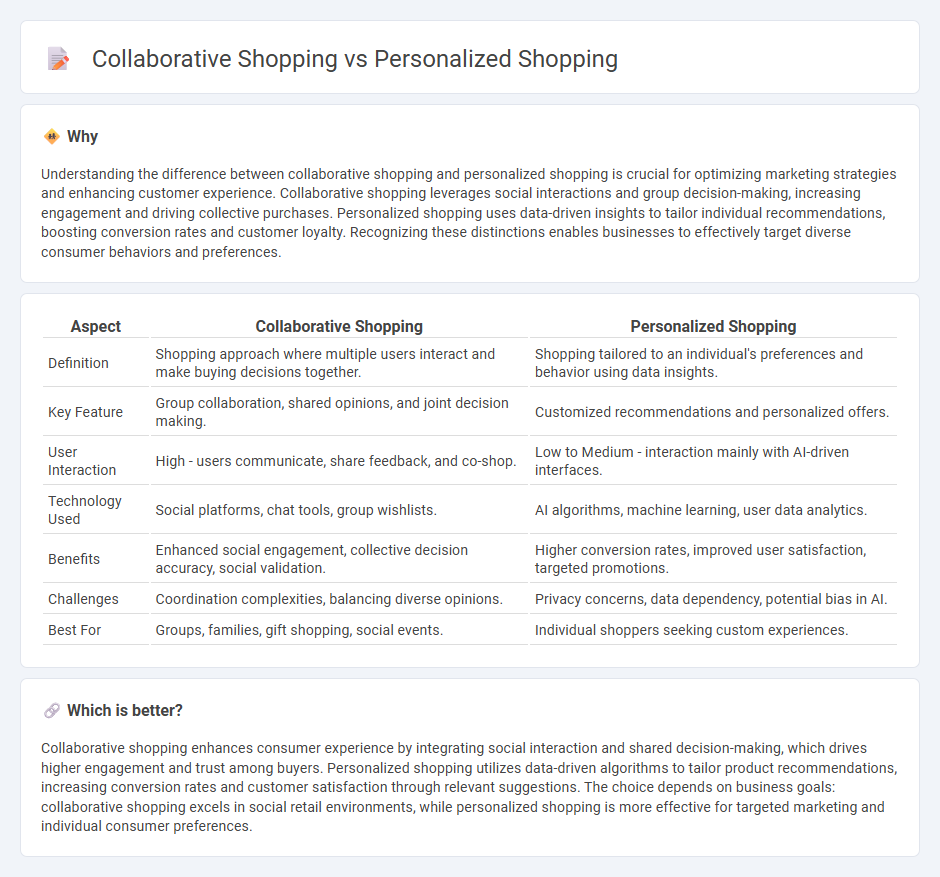
Collaborative shopping enhances consumer engagement by allowing groups to share preferences and make collective purchasing decisions in real time, boosting social interaction and satisfaction. Personalized shopping leverages advanced algorithms and data analytics to tailor product recommendations and offers based on individual behavior, increasing conversion rates and customer loyalty. Explore the differences and benefits of collaborative and personalized shopping to optimize your retail strategy.
Why it is important
Understanding the difference between collaborative shopping and personalized shopping is crucial for optimizing marketing strategies and enhancing customer experience. Collaborative shopping leverages social interactions and group decision-making, increasing engagement and driving collective purchases. Personalized shopping uses data-driven insights to tailor individual recommendations, boosting conversion rates and customer loyalty. Recognizing these distinctions enables businesses to effectively target diverse consumer behaviors and preferences.
Comparison Table
| Aspect | Collaborative Shopping | Personalized Shopping |
|---|---|---|
| Definition | Shopping approach where multiple users interact and make buying decisions together. | Shopping tailored to an individual's preferences and behavior using data insights. |
| Key Feature | Group collaboration, shared opinions, and joint decision making. | Customized recommendations and personalized offers. |
| User Interaction | High - users communicate, share feedback, and co-shop. | Low to Medium - interaction mainly with AI-driven interfaces. |
| Technology Used | Social platforms, chat tools, group wishlists. | AI algorithms, machine learning, user data analytics. |
| Benefits | Enhanced social engagement, collective decision accuracy, social validation. | Higher conversion rates, improved user satisfaction, targeted promotions. |
| Challenges | Coordination complexities, balancing diverse opinions. | Privacy concerns, data dependency, potential bias in AI. |
| Best For | Groups, families, gift shopping, social events. | Individual shoppers seeking custom experiences. |
Which is better?
Collaborative shopping enhances consumer experience by integrating social interaction and shared decision-making, which drives higher engagement and trust among buyers. Personalized shopping utilizes data-driven algorithms to tailor product recommendations, increasing conversion rates and customer satisfaction through relevant suggestions. The choice depends on business goals: collaborative shopping excels in social retail environments, while personalized shopping is more effective for targeted marketing and individual consumer preferences.
Connection
Collaborative shopping leverages real-time social interactions and shared decision-making to enhance personalized shopping experiences by tailoring product recommendations based on group preferences and individual tastes. Personalized shopping utilizes data analytics and machine learning algorithms to customize product suggestions, which can be further enriched through collaborative inputs from friends or family. Both approaches merge social dynamics with AI-powered customization, driving higher customer engagement and improved conversion rates in e-commerce.
Key Terms
Recommendation Systems
Personalized shopping leverages user data and machine learning algorithms to tailor recommendations specifically to individual preferences, enhancing user satisfaction and conversion rates. Collaborative shopping, by contrast, incorporates social interactions and group preferences, utilizing collective intelligence and social recommendation systems to improve decision-making. Explore the latest advancements in recommendation systems to optimize both personalized and collaborative shopping experiences.
User Profiles
Personalized shopping leverages detailed user profiles by analyzing individual preferences, browsing history, and purchase behavior to tailor recommendations uniquely suited to each customer. Collaborative shopping utilizes aggregated data from multiple user profiles to identify common interests and trends, enhancing the shopping experience through community-driven suggestions and shared preferences. Discover how the integration of user profile data transforms both personalized and collaborative shopping experiences.
Social Commerce
Personalized shopping leverages user data and AI algorithms to tailor product recommendations based on individual preferences, enhancing user satisfaction and increasing conversion rates. Collaborative shopping emphasizes social interactions, enabling groups to share opinions, co-browse, and make purchasing decisions collectively, which fosters engagement and trust within communities. Discover the impact of these approaches on social commerce trends and how they transform online retail experiences.
Source and External Links
Ecommerce personalization: How fashion brands can create personalized shopping experiences - Personalized shopping experiences enhance conversion rates, customer loyalty, and average order value by using smart segmentation, tailored product recommendations, and targeted promotions to create relevant and timely ecommerce interactions for customers in the fashion sector.
Ecommerce Personalization: A Complete Guide | Salesforce US - Personalized shopping leverages AI and automation to display products tailored to customer interests in real-time, resulting in improved customer engagement, retention, loyalty, and higher sales conversion in retail.
The Future of Personalization Is Here: Trends to Look Out for in 2025 - AI-driven personalization is increasingly used to recommend products based on previous purchases and preferences, helping brands save customers' time and increase basket sizes by suggesting relevant "discovery" items.
 dowidth.com
dowidth.com